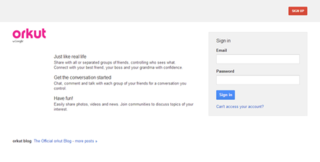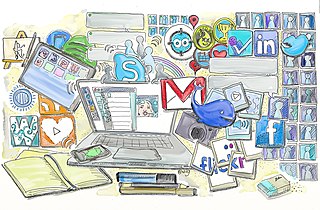Social software, also known as social apps or social platform includes communications and interactive tools that are often based on the Internet. Communication tools typically handle capturing, storing and presenting communication, usually written but increasingly including audio and video as well. Interactive tools handle mediated interactions between a pair or group of users. They focus on establishing and maintaining a connection among users, facilitating the mechanics of conversation and talk. Social software generally refers to software that makes collaborative behaviour, the organisation and moulding of communities, self-expression, social interaction and feedback possible for individuals. Another element of the existing definition of social software is that it allows for the structured mediation of opinion between people, in a centralized or self-regulating manner. The most improved area for social software is that Web 2.0 applications can all promote co-operation between people and the creation of online communities more than ever before. The opportunities offered by social software are instant connections and opportunities to learn.An additional defining feature of social software is that apart from interaction and collaboration, it aggregates the collective behaviour of its users, allowing not only crowds to learn from an individual but individuals to learn from the crowds as well. Hence, the interactions enabled by social software can be one-to-one, one-to-many, or many-to-many.
Viral marketing is a business strategy that uses existing social networks to promote a product mainly on various social media platforms. Its name refers to how consumers spread information about a product with other people, much in the same way that a virus spreads from one person to another. It can be delivered by word of mouth, or enhanced by the network effects of the Internet and mobile networks.

Friendster was a social network based in Mountain View, California, founded by Jonathan Abrams and launched in March 2003. Later, the company became a social gaming site based in Kuala Lumpur, Malaysia. Before Friendster was redesigned, the service allowed users to contact other members, maintain those contacts, and share online content and media with those contacts. The website was also used for dating and discovering new events, bands and hobbies. Users could share videos, photos, messages, and comments with other members via profiles and networks. It is considered one of the original social networks.

Orkut was a social networking service owned and operated by Google. The service was designed to help users meet new and old friends and maintain existing relationships. The website was named after its creator, Google employee Orkut Büyükkökten.
Tencent QQ, also known as QQ, is an instant messaging software service and web portal developed by the Chinese technology company Tencent. QQ offers services that provide online social games, music, shopping, microblogging, movies, and group and voice chat software. As of March 2023, there were 597 million monthly active QQ accounts.
The social web is a set of social relations that link people through the World Wide Web. The social web encompasses how websites and software are designed and developed in order to support and foster social interaction. These online social interactions form the basis of much online activity including online shopping, education, gaming and social networking services. The social aspect of Web 2.0 communication has been to facilitate interaction between people with similar tastes. These tastes vary depending on who the target audience is, and what they are looking for. For individuals working in the public relation department, the job is consistently changing and the impact is coming from the social web. The influence held by the social network is large and ever changing.
Image sharing, or photo sharing, is the publishing or transfer of digital photos online. Image sharing websites offer services such as uploading, hosting, managing and sharing of photos. This function is provided through both websites and applications that facilitate the upload and display of images. The term can also be loosely applied to the use of online photo galleries that are set up and managed by individual users, including photoblogs. Sharing means that other users can view but not necessarily download images, and users can select different copyright options for their images.

A social networking service or SNS is a type of online social media platform which people use to build social networks or social relationships with other people who share similar personal or career content, interests, activities, backgrounds or real-life connections.
BuzzNet is a photo, journal, and video-sharing social media network that is currently owned by Hive Media. The network was owned by SpinMedia from its inception until September 2016, when it was sold to Hive Media.

Flock is a discontinued web browser that specialized in providing social networking and Web 2.0 facilities built into its user interface. Earlier versions of Flock used the Gecko HTML rendering engine by Mozilla. Version 2.6.2, released on January 27, 2011, was the last version based on Mozilla Firefox. Starting with version 3, Flock was based on Chromium and so used the WebKit rendering engine. Flock was available as a free download, and supported Microsoft Windows, Mac OS X and, at one time, Linux as well.

Bolt was a social networking and video website active from 1996 to 2007 before reopening in April 2008. It was shut down for a period of one year due to copyright violations leading to bankruptcy. It was acquired by new owners on January 4, 2008 and operated successfully for several months before announcing plans to go offline in October 2008.
Xbox Play Anywhere, formerly Live Anywhere, is an ongoing initiative by Microsoft Gaming to bring the cross-platform Xbox network service to a wide variety of Microsoft platforms and devices, chiefly the Xbox Series X|S, Xbox One, and Windows 10.
The online service imeem was a social media website where users interacted with each other by streaming, uploading and sharing music and music videos. It operated from 2003 until 2009 when it was shut down after being acquired by MySpace.
The terms internet church, online church, cyberchurch, and digital church refer to a wide variety of ways that Christian religious groups can use the internet to facilitate their religious activities, particularly prayer, discussion, preaching and worship services. The internet has become a site for religious experience which has raised questions related to ecclesiology.

Odnoklassniki, abbreviated as OK or OK.ru, is a social network service used mainly in Russia and former Soviet Republics. The site was launched on March 4, 2006 by Albert Popkov and is currently owned by VK.

The Renren Network, formerly known as the Xiaonei Network, is a Chinese social networking service similar to Facebook. It was popular among college students. Renren Inc. has its headquarters in Chaoyang District, Beijing, with additional offices in Shanghai and Guangzhou. Renren had an $740m initial public offering (IPO) on the New York Stock Exchange in April 2011.

Bebo was an American social networking website that originally operated from 2005 until its bankruptcy in 2013 and relaunched in February 2021. The site relaunched several times after its bankruptcy with a number of short-lived offerings, including instant messaging and video streaming, until its acquisition by Amazon in July 2019 when it was shut down. It was announced in January 2021 that it would be returning as a new social media site the month after. By May 2022, it had once again been shut down, without having ever left beta testing.

MSN Messenger, later rebranded as Windows Live Messenger, was a cross-platform instant-messaging client developed by Microsoft. It connected to the now-discontinued Microsoft Messenger service and, in later versions, was compatible with Yahoo! Messenger and Facebook Messenger. The service was discontinued in 2013 and was replaced by Skype.

Social media marketing is the use of social media platforms and websites to promote a product or service. Although the terms e-marketing and digital marketing are still dominant in academia, social media marketing is becoming more popular for both practitioners and researchers. Most social media platforms have built-in data analytics tools, enabling companies to track the progress, success, and engagement of social media marketing campaigns. Companies address a range of stakeholders through social media marketing, including current and potential customers, current and potential employees, journalists, bloggers, and the general public. On a strategic level, social media marketing includes the management of a marketing campaign, governance, setting the scope and the establishment of a firm's desired social media "culture" and "tone".

Multiply was a social networking service with an emphasis on allowing users to share media – such as photos, videos and blog entries – with their "real-world" network. The website was launched in March 2004 and was privately held with backing by VantagePoint Venture Partners, Point Judith Capital, Transcosmos, and private investors. Multiply had over 11 million registered users. The company was headquartered in Boca Raton, Florida but moved to Jakarta, Indonesia early in 2012 and recently announced intentions to switch to e-commerce, dropping the social networking aspect entirely. Quantcast estimates Multiply had 2.47 million monthly U.S. unique visitors at their peak on July 30, 2012.








